SeaQuest—Notorious for Exploiting Animals
Vince Covino, CEO of SeaQuest, Quits!
Update (August 8, 2024): Vince Covino, founder and CEO of SeaQuest, announced that he’s quitting the company! We can’t say “good riddance” fast enough to the infamous animal exploiter responsible for scores of animal deaths that occurred under his leadership.
The move won’t clean up the chain’s mess—which includes ballooning allegations of animal deaths, human injuries, and widespread neglect—but it’s a sign that confidence in the company is flagging.
Covino’s latest move comes after years of pressure from the public and PETA, which exposed SeaQuest aquariums for the sleazy petting zoos they are. The company’s current chief financial officer, Aaron Neilsen, will reportedly replace Covino as SeaQuest’s CEO, showing that SeaQuest intends to keep prioritizing profits over animal protection.
After a string of SeaQuest closures (and potential new locations snubbed!), the company must ride the tidal wave of change and send its animal prisoners to reputable facilities where they can get the care they need.
Original post:
SeaQuest aquariums are plagued by animal welfare issues, animal deaths, legal violations, and injuries to employees and the public from direct contact with animals. SeaQuest continues to be hit with neglect allegations, often from former employees; has an ever-growing list of U.S. Department of Agriculture (USDA) citations; and is notorious for exploiting animals for entertainment.
Animals at SeaQuest desperately need our help. Taking action has never been easier.
Here’s How PETA Is Taking Action Against SeaQuest
- SeaQuest Fort Worth closed in October 2024 after PETA submitted a complaint to local authorities over whistleblower reports from three former SeaQuest Fort Worth employees revealing that dozens of fish, rays, and sharks perished at the seedy facility or during transport there. The complaint prompted the Fort Worth Police Department to open a criminal cruelty-to-animals investigation.
- After a lengthy history of federal and state citations, a license suspension, and illegal activity, SeaQuest Littleton in Colorado shut down in February 2024. Its closure came after PETA filed numerous complaints with federal and state authorities regarding dangerous and cruel incidents, including ones in which customers were bitten and animals suffered without adequate veterinary care.
- After PETA filed numerous complaints with various federal and state authorities detailing egregious animal welfare issues and numerous injuries to customers at SeaQuest Trumbull in Connecticut, the sleazy aquarium shut down in August 2023.
- PETA alerted the USDA to appalling conditions at SeaQuest Trumbull after being contacted by a former employee who reported that animals at the facility were regularly denied veterinary care, often despite obvious health problems; were confined to cramped cages for months at a time; and had direct contact with the public that resulted in injuries to visitors.
- PETA sent a letter to Stonecrest, Georgia, calling on the city not to change the zoning law, which would allow SeaQuest to remain at the Stonecrest mall. The corrupt former mayor of the city had allowed SeaQuest to set up shop in violation of the existing zoning law. Despite opposition from the public, the new zoning law was passed. Yet less than a month after the city changed the law to allow SeaQuest to stay, the company announced that it had sold SeaQuest Stonecrest and transferred all the animals to other facilities. PETA will continue to keep pressure on city officials to make sure this sleazy aquarium doesn’t reopen there.
- PETA filed a complaint with the Federal Trade Commission calling on the agency to investigate SeaQuest and the Austin Aquarium—another seedy indoor mall petting zoo—over the facilities’ interactive business model and lax animal handling practices that have repeatedly jeopardized the public’s safety.
- Sam’s Club ended the sale of discount tickets to SeaQuest following discussions with PETA.
- Just days after PETA wrote to the North Dakota attorney general reporting that SeaQuest CEO Vince Covino’s bid to open a cruel operation in a former Grand Forks department store was based on lies, Covino backed out of his plans to add this North Dakota location to his chain of petting zoo aquariums.
- PETA received records from Clark County Animal Control in Nevada showing that a second sloth died at SeaQuest Las Vegas nine months after the first sloth died there and that both animals died under similar troubling circumstances: They had each been at the facility for less than a year when they developed twitching behavior and had a reduced appetite just before their deaths. After PETA called on Clark County Animal Control to prohibit SeaQuest from obtaining any more sloths who may suffer the same fate, the agency said on record that it “cannot foresee granting SeaQuest permission for another sloth should they apply to have one.”
- PETA urged the U.S. Department of Agriculture (USDA) to terminate SeaQuest’s federal Animal Welfare Act license because the licensee had violated a number of state and local laws pertaining to the transportation, ownership, neglect, and welfare of animals.
- PETA placed a giant billboard in heavily trafficked areas of SeaQuest’s operations in Littleton, Colorado. It featured a blood-soaked parody of SeaQuest’s logo and urged families to steer clear of the shady company’s animal exploitation.
- In May 2019, SeaQuest withdrew its application to open a planned facility in Oyster Bay, New York. This victory came after PETA contacted the town’s board and identified legally required disclosures that SeaQuest failed to provide as part of its permit application. The town gave the shady company the opportunity to provide that information, but it opted to withdraw its application instead. Actor and PETA supporter Alec Baldwin had also sent a letter urging officials in Oyster Bay to deny the permit.
- In December 2020—as part of an agreement to settle a lawsuit filed by PETA, the Animal Rights Foundation of Florida, and activist Ana Campos—SeaQuest dropped its bid to open a location at The Galleria at Fort Lauderdale in Florida. The lawsuit alleged that the city violated zoning laws when issuing SeaQuest a permit. The permit was issued under the false pretense that SeaQuest is a museum—even though its primary purpose is exhibiting live animals with an emphasis on direct contact.
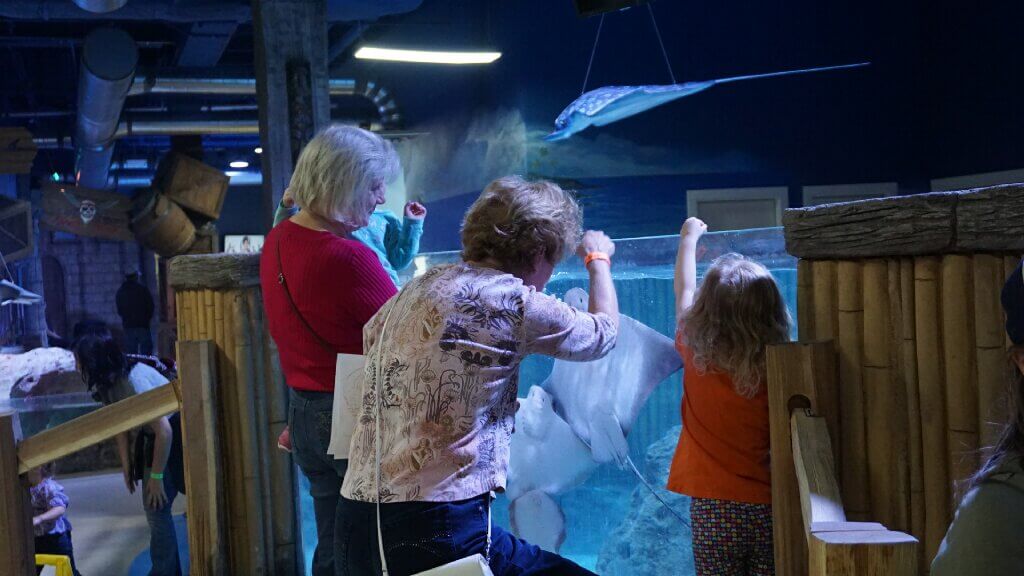
SeaQuest Has a Long History of Animal Neglect and Legal Troubles
Since SeaQuest opened its first location, the notorious aquarium chain has received dozens of citations from the USDA, and that number keeps growing—hundreds of animals have died and countless visitors have been injured at its facilities. This lengthy list of animal neglect and public safety concerns never seems to end:
- In 2018, National Geographic published an article about the sordid and dubious aquarium industry, including discussions of the Covino family and the widespread opposition to SeaQuest.
- SeaQuest’s CEO, Vince Covino, was fined $5,000 in 2017 for securities violations after failing to reveal a prior disciplinary action to potential investors.
- Vince’s brother, Ammon Covino, has been convicted in federal court for illegal wildlife trafficking.
- In 2013, he was sentenced in federal court to more than a year in prison after pleading guilty to conspiracy to commit illegal wildlife trafficking.
- In February 2016, he was sent back to prison after violating his parole by working at the San Antonio and Austin aquariums.
- Later that same year, even though his parole restrictions prohibited him from doing so, Ammon was involved in the opening of SeaQuest aquariums in both Nevada and Utah, for which he was again sent back to prison.
- At the now-closed Portland Aquarium in Oregon, which was co-owned by both Vince and Ammon, more than 200 animals reportedly died over the course of three months. Many of the animals—including seahorses, stingrays, garden eels, bamboo sharks, and other species of fish—allegedly died from starvation, infection, and other seemingly preventable causes. The brothers even acknowledged that the facility went without regular veterinary services during this time.
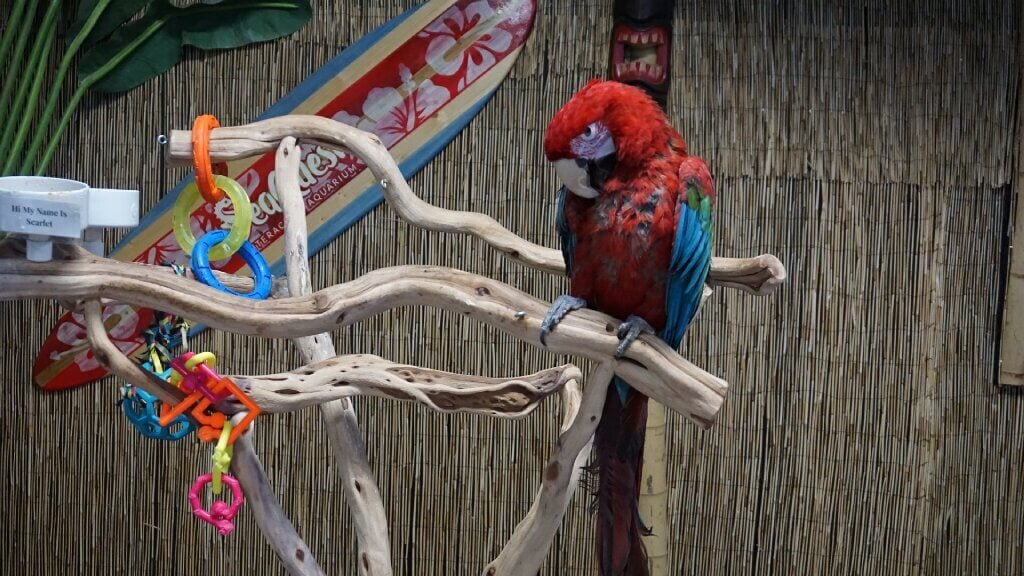
SeaQuest’s Growing List of Permit Violations and Legal Woes
- In December 2022, the USDA fined SeaQuest $4,500 for multiple alleged violations of the federal Animal Welfare Act. The fine addressed multiple citations for inadequate handling that resulted in the following: Guests were bitten by otters, coatis, and a kinkajou; a flying squirrel died after a door was closed on the animal; and a door fell on an otter and injured the animal’s foot.
Trouble at SeaQuest Woodbridge in New Jersey
- On June 25, 2024, the New Jersey Department of Environmental Protection (NJDEP) issued SeaQuest a Notice of Violation and a $2,500 fine after an investigation revealed violations of several state regulations. The notice required that the facility immediately provide all regulated wildlife adequate veterinary care and cease all public interactions with unauthorized animals. The agency also put SeaQuest on administrative probation until further notice, which prohibits them from acquiring any new regulated animals while under probation.
- On January 29, 2024, NJDEP urged SeaQuest to temporarily discontinue public interactions with animals due to a mycobacteria outbreak at the facility, which caused shell rot infections in the turtles. The agency noted that poor husbandry is one of the main causes of shell rot infections.
- On September 28, 2023, NJDEP sent a letter to SeaQuest documenting multiple concerns observed at the facility during an inspection, including: two macaws with an alarming amount of missing feathers; a two-toed sloth and a blue-tongued skink without access to adequate amounts of drinking water; an Asian water monitor without access to enough water to swim or soak in; a red tegu with abnormal white areas on his back that had not been assessed by the veterinarian; among other issues. The letter also noted that the facility failed to intervene when animals housed together showed signs of aggression, potentially leading to the death of a water monitor. The facility was also ordered to immediately cease all interactions with unauthorized animals. The agency put SeaQuest on a year-long probation, prohibiting the facility from acquiring regulated animals and implementing new public interactions due to continued violations of New Jersey’s exotic and nongame permit regulations.
Trouble at SeaQuest Littleton in Colorado
- In November 2021, SeaQuest Littleton in Colorado pleaded guilty to illegally purchasing a snapping turtle—one of several species the facility had been prohibited from possessing since Colorado Parks and Wildlife (CPW) suspended its license.
- In June 2021, SeaQuest Littleton was slapped with a federal citation for its failure to have species-appropriate enclosures after a wallaby named Ben drowned in an aquarium tank there. That’s according to a U.S. Department of Agriculture inspection report obtained by PETA. Ben’s terrifying death came about because he was unable to escape from the tank, which had no stairs leading out of it.
- In April 2019, after SeaQuest Littleton racked up numerous citations, the facility’s zoological parks license was suspended for two years by CPW.
- In late 2018, Colorado officials cited SeaQuest for failing to report injuries to a sloth, who had been burned by a heat lamp on two occasions. He had multiple raw areas and redness with scabbing and skin sloughing on his face, and a couple of the wounds were oozing. One burn was so severe that he winced when eating. The company failed to notify a veterinarian about the injuries, even though it told state officials that it had.
- State inspectors from the Colorado Department of Agriculture denied SeaQuest a permit after it failed multiple pre-licensing inspections during which officials had concerns about the bird exhibit, which they said was “potentially dangerous” for the animals. SeaQuest’s request for authorization to open temporarily until a final permit was issued was denied, yet it opened anyway. Subsequently, state officials issued it a cease and desist order because it was operating without a permit.
- Following that order, the aquarium transferred approximately 80 parakeets to a teenage employee, whose family then advertised them online for free, and the birds were given away in a hardware store parking lot.
- In June 2018, SeaQuest also violated the law by importing two capybaras and a sloth into Colorado without permits and then harboring the animals in the manager’s residential basement. The aquarium put them on display, even though it lacked the authorization to do so. Just two months later, SeaQuest received another warning for the illegal importation of animals, this time for a caiman and a wallaby.
- SeaQuest was also cited and fined for failing to report the death of a kookaburra who had reportedly died from drowning. The company initially reported that the bird had choked on a toy but later confirmed that she had actually drowned in a water bowl. CPW also issued SeaQuest a warning for failing to report the death of 250 trout while in transit to the aquarium.
Trouble at SeaQuest Las Vegas
- In December 2021, a door fell on an otter’s foot, resulting in the dislocation of one toe, a fracture to another toe, and a laceration of his footpad. The USDA cited and fined SeaQuest for the incident.
- In 2019, Clark County Animal Control cited SeaQuest Las Vegas, fined it $2,000, and revoked its exotic-wildlife permit for possessing unpermitted animals, including illegally bred otters. Clark County Animal Control subsequently reissued the permit but with stricter conditions.
- In October 2018, a capybara escaped while being transported in a dog carrier in the back of an open truck bed. The animal was found badly injured, bleeding from the face and limping, reportedly in a Target parking lot. SeaQuest was cited and fined for the incident.
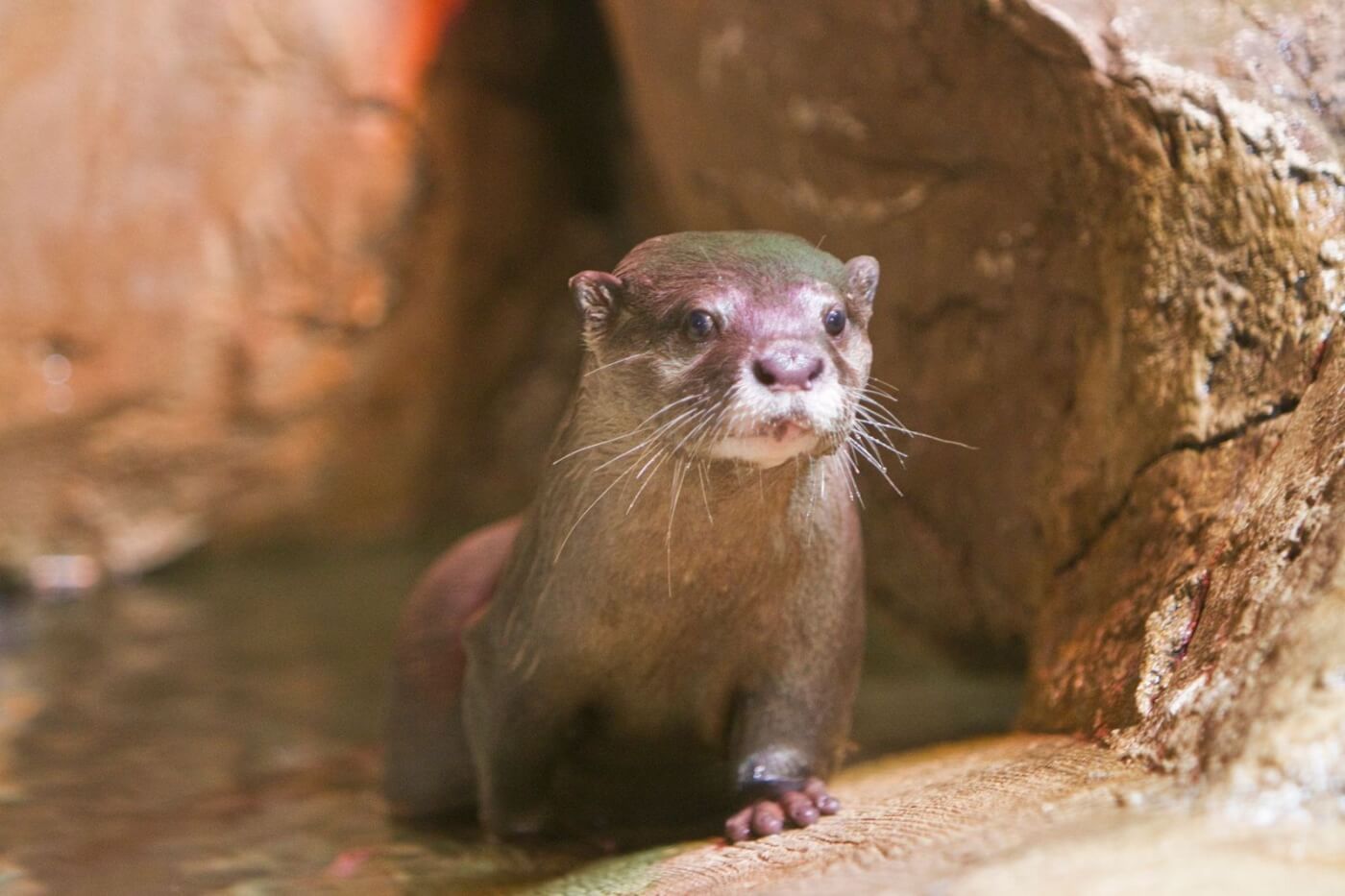
Reports of Dead and Suffering Animals at SeaQuest
From Former SeaQuest Employees
- Three former SeaQuest employees in Fort Worth, Texas, reported that:
- Two nurse sharks, named Icarus and Achilles, had likely starved to death as a result of extreme stress from being confined to a small, cramped tank with 10 other animals.
- Dozens of marine animals reportedly died in plastic bags, likely suffocating to death during transport to SeaQuest Fort Worth from the now-closed SeaQuest Littleton location in Colorado.
- Several koi endured likely excruciating deaths from being left in a tank with toxic levels of ammonia for at least four hours.
- A former SeaQuest employee in Trumbull, Connecticut, reported that parakeets frequently became “egg bound” (a life-threatening condition in which eggs become stuck inside a bird), cockatiels were deprived of food to force them to interact with guests, and a sloth fell to the floor when his nails broke off, likely due to inadequate humidity in his enclosure.
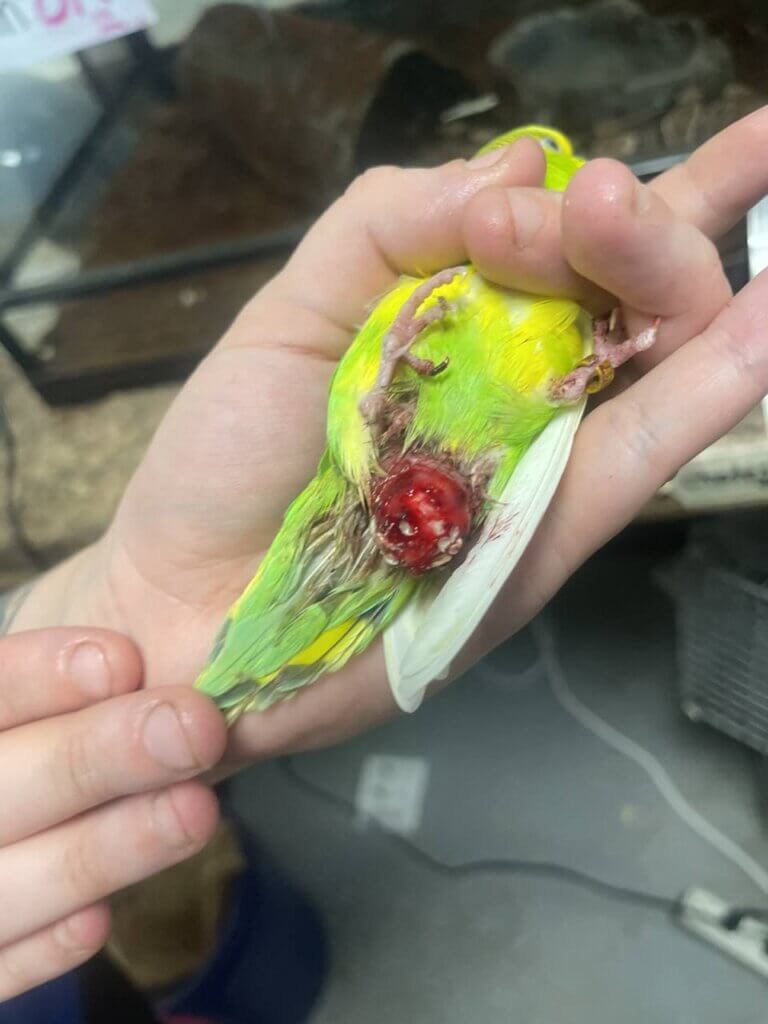
- A former SeaQuest employee alleged that SeaQuest Las Vegas withheld food from animals to force them to interact with guests who pay to feed them.
- A February 2019 three-part investigative report exposed several issues with the SeaQuest Las Vegas exhibit, as described by five former employees who alleged that the facility is dangerous for the public, staff, and animals.
- One former employee reported that children stomped on birds in the interactive aviary, killing them, and that the dead animals were thrown into the garbage, reportedly to prevent SeaQuest from having to document their deaths.
- Another former employee reported a similar pattern with small turtles, some of whom were crushed by children. “I think they started with 12. By the time I left they had three,” he said.
- A former employee also reported that a large octopus was “literally cooked alive” after a change in the tank’s temperature overheated the water.
- According to reports, the former employees also provided videos and photos of “a sump room wall covered in black mold, a dead turtle they say was left to rot for days in the koi tank, and a bug-infested drain in the aviary where they say birds drank and bathed before interacting with guests.”
- In 2017, a former employee came forward with reports of apparent animal neglect at SeaQuest Las Vegas, saying that he saw hundreds of animals die.
From Government Records
- The USDA issued SeaQuest Roseville a critical citation after a parakeet got caught in and enclosure door and died.
- The USDA issued SeaQuest Roseville a citation for failing to follow appropriate methods to prevent and treat injuries for two wallabies who had torn claws on their toes. The inspector noted that the areas appeared tender, and the wallabies had many overgrown claws on their other toes that curved and shifted to the side.
- The USDA issued SeaQuest Littleton in Colorado a critical citation after a sugar glider named Luna had to have half her tail amputated because it had become entangled in a piece of chain in her enclosure.
- The USDA issued SeaQuest Fort Worth in Texas a critical repeat citation after five sugar gliders horrifically died after they became trapped in a PVC pipe.
- The USDA cited SeaQuest Folsom in California for jeopardizing the health and welfare of sloths by failing to ensure that their enclosures had the correct temperature and humidity, which could lead to multiple health issues and death.
- According to records obtained by PETA, the USDA cited the SeaQuest location in Woodbridge, New Jersey, after a flying squirrel was closed in a door, killing the animal, in June 2021. The squirrel had been attempting to flee from an enclosure after an encounter with a visitor.
- In July 2020, a 1-year-old sloth named Flash died at SeaQuest’s facility in Las Vegas, Nevada. Flash was very thin when he died and had a history of weakness, twitching, and lack of appetite. PETA asked the USDA to investigate the circumstances that led to his death, including whether SeaQuest could adequately care for this species.
- Just nine months later, in April 2021, another sloth named Flash died under similar circumstances at SeaQuest Las Vegas. The second Flash had only been at SeaQuest Las Vegas for five months before he died. The necropsy documented that he had been found “minimally responsive on the floor” and had “developed twitching behavior” and lack of appetite—similar symptoms to those displayed by the first Flash, who died just seven months after his arrival at SeaQuest. When one sloth died at SeaQuest, the company simply got another, gave him the same name, and let him suffer the same fate.
- According to a report following a USDA inspection, in June 2020, an employee of SeaQuest Trumbull in Connecticut was caught hitting otters with a metal bowl.
- After a female otter died in May 2018, the necropsy report stated that “[t]he stress of shipping to Vegas, introduction to a new environment and caging during construction may have caused fatal cardiac consequences.”
- Another otter named Jelly drowned after getting her arm stuck in a filtration system. SeaQuest Las Vegas admitted that it had never reported the incident to CCAC.
- According to a CPW document, a child visiting SeaQuest Littleton kicked and stomped on birds in the interactive aviary, resulting in the death of five birds and injuries to others.
- In December 2018, a very thin iguana named Violet died at SeaQuest Littleton a week after a veterinarian advised that the animal had a poor prognosis and was likely going to die. SeaQuest had been attempting to force-feed her. The veterinarian’s notes report that in that same week, another underweight iguana died.
From Members of the Public Who Visited a SeaQuest Aquarium
- In September 2021, a visitor to SeaQuest Las Vegas documented that the tail of a wolf eel named Saturn had been partially eaten, leaving painfully exposed tailbone. PETA immediately alerted Clark County Animal Control. Even though SeaQuest was already aware of the injury, it hadn’t bothered to contact a veterinarian about it until six days after PETA alerted authorities. Saturn was eventually euthanized after suffering for months.
- In January 2020, after a video of skittish goats huddled in a corner at SeaQuest Woodbridge in New Jersey went viral, concerned people took action and persuaded SeaQuest to close its goat exhibit at this location and move the goats to a local rescue facility.
- Within a month of the grand opening of the SeaQuest aquarium in Folsom, California, a stingray died. The animal was found in a touch tank by a visitor who noticed the lifeless body, partially buried under sand. Reportedly, kids were touching the corpse.
- A visitor to SeaQuest Folsom documented that it took approximately two minutes for staff to return a fish to water after the animal jumped out of an uncovered tank. The fall from the tank to the floor alone was enough to daze and disorient the fish, who was left to flop on the ground for a prolonged period of time out of the water, likely suffocating.
Public Safety Concerns Over SeaQuest Aquariums
- On September 19, 2024, the USDA cited SeaQuest Fort Worth after a sloth named Flash and a Bengal cat named Anubis bit members of the public.
- On June 6, 2023, the USDA cited SeaQuest Las Vegas after a wallaby jumped up at a child during an encounter, making contact with the child’s face.
- On February 21, 2023, the USDA issued SeaQuest in Littleton, Colorado, a critical citation after a Savannah cat bit a member of the public, breaking the skin and resulting in a six-month quarantine for all the cats because SeaQuest didn’t know which one had been involved in the incident.
- On September 22, 2022, the USDA issued SeaQuest in Fort Worth, Texas, a repeat citation after a wallaby bit a child on the finger. The USDA stated, “This facility has a history of public injury during it’s [sic] ‘animal encounters.’”
- On June 5, 2022, a mother reportedly rushed her 3-year-old son to the emergency room after an iguana at SeaQuest Fort Worth jumped and “latched [onto] his arm.” According to the woman, her child required six stitches to close his gaping wounds. The next day, another mother reported that a blue-and-yellow grouper in a stingray touch tank had bitten her infant daughter, leaving bloody scrapes across three of her baby’s fingers. The mother told PETA that after the incident, an employee said, “I wish I could tell you this is the first time this has happened.”
- In February 2022, the USDA cited the SeaQuest aquarium in Trumbull, Connecticut, after a kinkajou scratched a young child in the face when the animal leaped off the child’s shoulder to get to a food bowl held by another child. The citation concluded, “[I]t is apparent that the animal was not handled in a manner so that there was a minimal risk of harm to the animal or the public.”
- In December 2021, the USDA cited SeaQuest in Layton, Utah after a kinkajou bit an unsupervised guest who had reached under the door of an enclosure and an Asian small-clawed otter bit a guest during a public interaction session.
- The USDA cited SeaQuest Trumbull in Connecticut after a July 2020 incident in which a small child was bitten by an otter during public feeding. Inspectors also found that for at least a year, SeaQuest had not properly secured the capybara enclosure. SeaQuest only added a lock to the enclosure door after an unsupervised member of the public was caught entering the area.
- In February 2021, the USDA cited SeaQuest Fort Worth in Texas when it found that visitors to the facility had been bitten by a capybara and a sloth. This was the third time the agency had cited the facility in connection with animals injuring guests. The two previous citations (in February 2019 and June 2019) were given because, on several occasions, SeaQuest had allowed members of the public to come into contact with an Asian small-clawed otter named Xander without an adequate barrier in place. Previously, in 2018, the USDA had issued the facility a “teachable moment” after multiple people were bitten and scratched by capybaras used for interactions.
- In January 2020, the USDA cited SeaQuest Layton in Utah a second time for allowing public interactions with Gus, a South American coatimundi, without adequate barriers or direct control of him. He bit a guest and an employee during a public interaction session. SeaQuest was first cited for failing to protect animals and the public with adequate barriers after Gus bit a guest and an employee in November 2019.
- In August 2019, a 12-year-old visitor to SeaQuest Trumbull in Connecticut was bitten by an otter. State authorities had told SeaQuest that it was obligated to keep animals in a manner that prevents risk of injury to the public and that allowing public feeding would not be in compliance with that requirement.
- Between June 2018 and January 2019, more than 40 humans—including over a dozen infants and children—were injured by animals at SeaQuest Littleton. One guest’s husband called 911 to report that his wife was having difficulty breathing and experiencing numbness after she reached into a tank and touched a pufferfish. (These fish naturally excrete an extremely potent, deadly neurotoxin.)
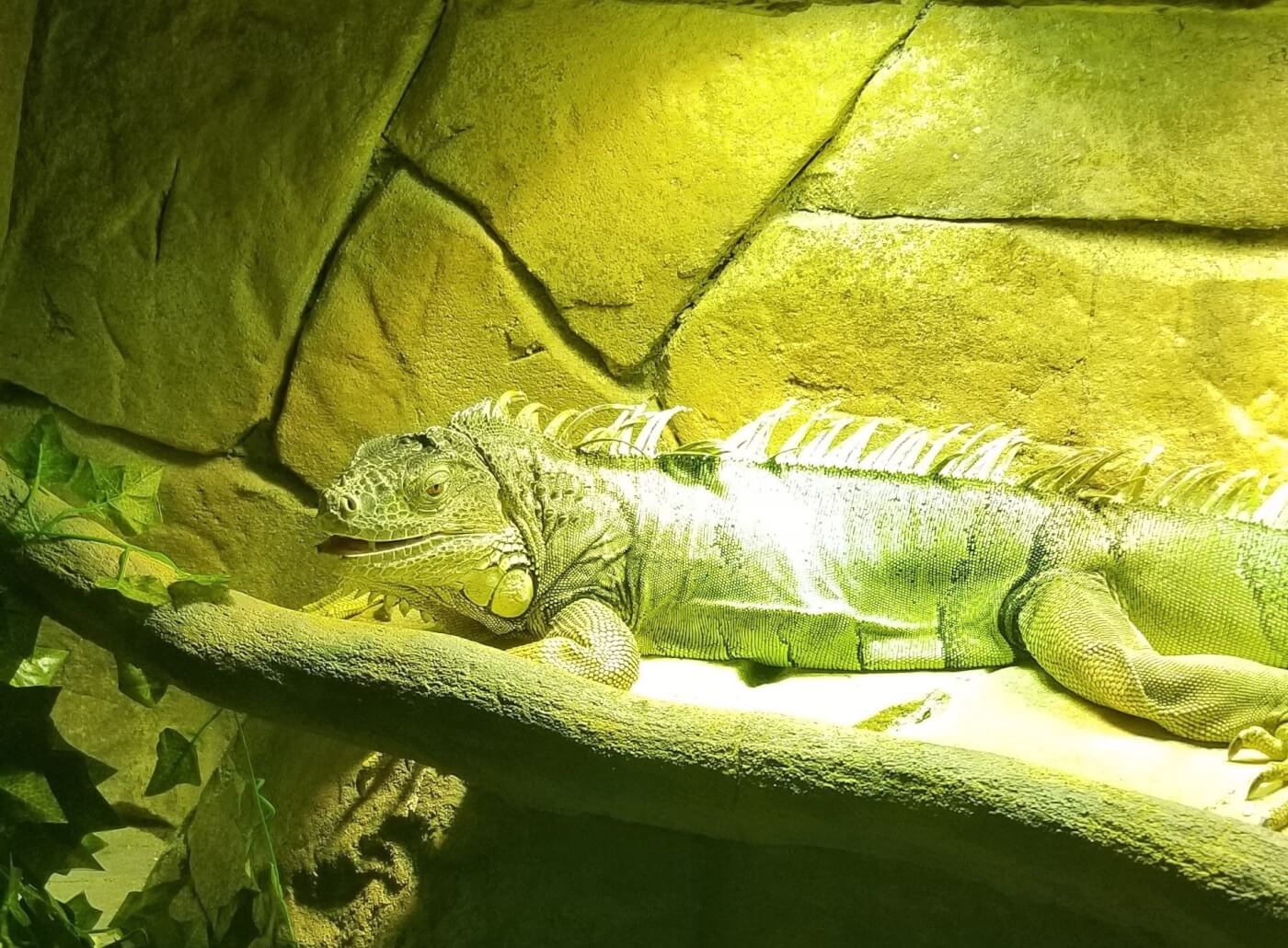
How You Can Help Animals at SeaQuest
These violations and SeaQuest’s apparent disregard for animals should be a red flag to everyone, especially those considering doing business with the company. If malls want to add some entertainment to their shoppers’ experience, there are tons of animal-friendly ways to do so. Sketch Aquarium: Connected World at the Newark Museum of Art in Newark, New Jersey, is a great example. It allows visitors to color animal templates, scan them, and digitally drop them into a virtual aquarium, where the images become animated and projected around the room, appearing to swim. Companies such as Simon Property Group—the nation’s largest shopping mall operator—have already committed to not working with SeaQuest. Now we must urge others to follow suit.
—Take Action Now—
Please take a moment to speak up for animals. There are multiple opportunities to help. As soon as you take one action below, another will appear in its place. After you enter your information, just keep clicking “Send Message” to make sure that your voice is heard. Once you’ve taken every action, share this page with your friends and family members. Encourage them to add their voices to help protect animals from further abuse: